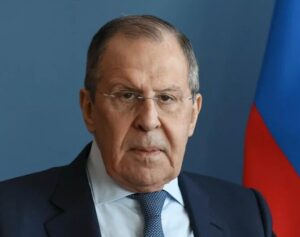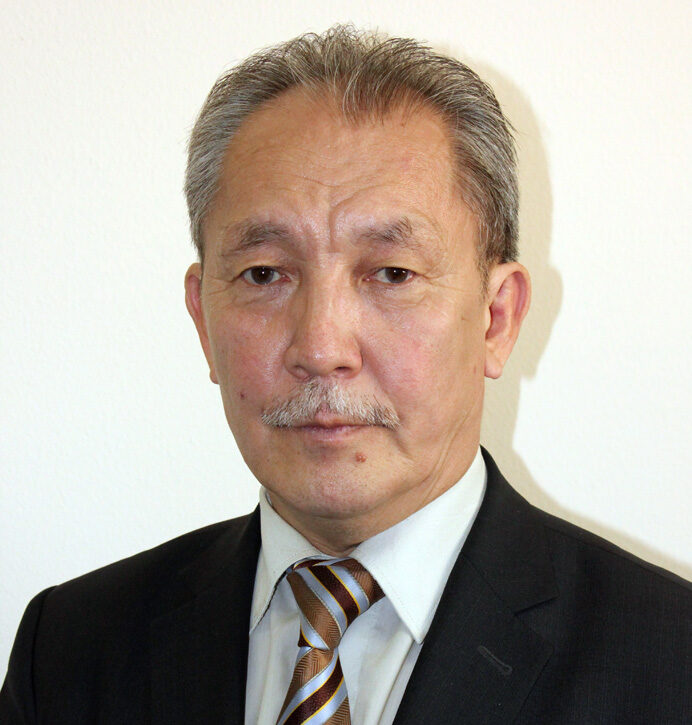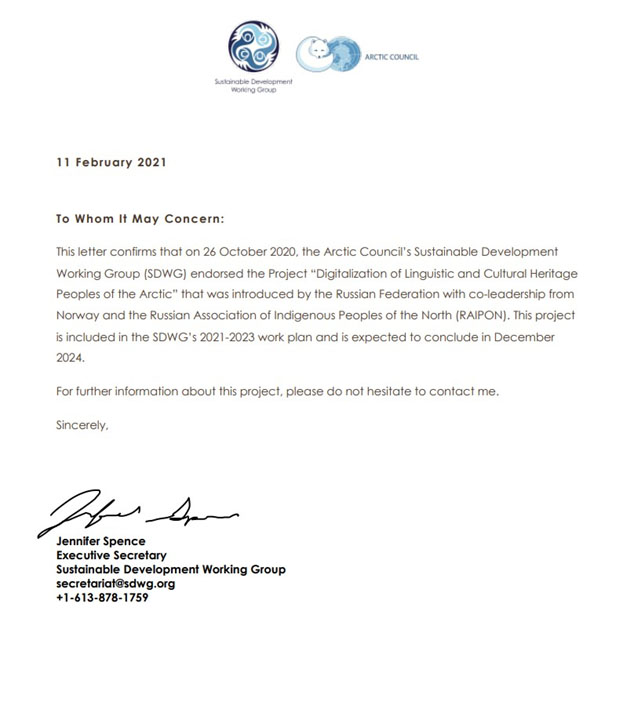ABOUT THE PROJECT
At the 12 th Arctic Council Ministerial Meeting in Reykjavik, Iceland, on May 20, 2021, foreign minister of Russia Sergey Lavrov noted in his report: “"...Russia stands for directing our common efforts primarily to improving the well-being and quality of life of people in the Arctic, increasing the availability of education and health services, expanding humanitarian exchanges, including youth exchanges, supporting initiatives aimed at preserving the identity and heritage of the indigenous peoples of the North, in accordance with, among other things, the goals and objectives of the International Decade of the Indigenous Languages (2022- 2032).
In this regard, I will highlight a specific project that was proposed by Russia and approved by all participants of the Arctic Council. I am referring to the “Digitalization of the Linguistic and Cultural Heritage of Indigenous Peoples of the Arctic” project. Starting next year, such a platform should start working on the Internet...".
Nikolay Korchunov's speech at the international workshop “Digitalization of the Cultural and Linguistic Heritage of the Indigenous Peoples of the Arctic” on the Northern Sustainable Development Forum. September 28, 2021.
Hello! Welcome to the Arctic Multilingual International Portal arctic- megapedia.com! arctic-megapedia.com!
The issue of preservation of linguistic and cultural heritage becomes even more relevant than ever before. As noted in the UNESCO Atlas of the world's languages in danger, about 200 languages have gone extinct just over the past three generations. The fact that along with the languages humanity also loses entire worldview systems, unique ways of communication, valuable knowledge, and whole worlds of different modes of thought is particularly alarming.
On October 26, 2020, Chairholder of the UNESCO Chair "Social and Human Adaptation of the Arctic Regions to Climate Change and Globalization" of the M.K. Ammosov North-Eastern Federal University, Ph.D. Anatoly Zhozhikov took part in the meeting of the Arctic Council Sustainable Development Working Group (SDWG) and presented a project "Digitalization of the linguistic and cultural heritage of the indigenous peoples of the Arctic." After a successful defense, the project received the status of an Arctic Council project. The leader of the project is the Russian Federation. The co-leaders are Kingdom of Norway and Russian Association of Indigenous Peoples of the North (RAIPON). The project aims to present the languages and cultures of the indigenous peoples of the Arctic of all eight Arctic states on a single international internet portal in a new multicultural environment.
Indigenous peoples of the Arctic have been mastering Arctic landscapes for many centuries. They adapted to extreme climatic conditions in permafrost, developed their authentic culture, and lived in harmony with nature, without violating the ecology of vulnerable northern nature. However, they are experiencing the challenges of modern society like no one else. The rapid processes of globalization and industrial development of the North have led to the fact that these peoples are on the verge of an ethnic crisis, which threatens their ethnic characteristics (language, culture, way of life, traditional industries: reindeer husbandry, hunting, fishing).
All this results in the extinction of the native languages and catastrophic decrease in the number of native speakers and the gradual loss of their distinctive cultural heritage and traditional way of life. We have to mitigate this trend by taking urgent measures to preserve and develop the languages and culture of the indigenous peoples of the Arctic. Modern ICTs may play a major role in the preservation and development of the languages and culture of the indigenous peoples of the Arctic.
At the present stage of the information society, we are witnessing processes of unprecedented communication of information in terms of volume and speed of transmission . The rapid development of the Internet has served as an impetus for the development of social networks, resulting in a new environment of multicultural communication in which there are no boundaries, distances and time constraints. Communication on the Internet, generally, has become possible in almost all languages of the peoples of the world. The development of the worldwide web, the blogosphere and digital libraries brought about entire communities that continuously produce, exchange and disseminate knowledge, both global and local. The Internet provides huge opportunities for users in terms of ensuring freedom of expression, education, preservation and development of culture, spirituality.
Unprecedented development has been achieved by mobile communications, the relevance of which has become even more effective due to their integration with the global Internet. The introduction of mobile applications such as VK, WhatsApp, Instagram and Telegram have received national recognition, and as a result a new environment of communication and exchange of almost all types of information began to form. Instagram и Телеграм получили всенародное признание, в результате чего стала формироваться новая среда общения и оперативной передачи практически всех видов информации.
Nowadays, a person began to live and communicate in two environments at once: in a real communication environment and in a virtual information environment. It should be noted that virtual communication begins to prevail over the traditional way of human communication. The birth of a new environment of multicultural communication in the global information space became the basis for dialogue and interaction of civilizations, cultures, religions, which will determine the worldview of the people of the 21st century and their sustainable development.
Without a doubt, all the languages and cultures of the peoples inhabiting our planet should be represented in this single and boundless infosphere.
Unfortunately, majority of information and services on the Internet are available only in the dominant languages. According to UNESCO, today only more than 400 languages out of 6,700 existing ones are used on the Internet, and the rest cannot adequately participate in information exchange and are forced to live as if in the shadow of the "dominant" nations, which, by imposing their language, also impose their worldview and their customs.
The aim of the project "Digitalization of the linguistic and cultural heritage of the indigenous peoples of the Arctic" is to create an international Internet portal on the languages and culture of the indigenous peoples of the Arctic. The project envisages wide use of modern digital technologies, creation of a GIS map and Arctic Indigenous Peoples’ knowledge database on a uniform multilingual portal, www.arctic-megapedia.com. The project will provide access to a wide range of information on ways to preserve and develop the linguistic and cultural heritage, as well as the traditional way of life of Indigenous Peoples of the Arctic. This will contribute to better understanding, advancing sustainable development and adapting to evolving living conditions in the Arctic.
Project Implementation Schedule:
January - December 2021, Preparatory Stage:
- Form an international team of contributing participants from Arctic States
- Develop a plan and events within the framework of the project
- Study best practices for preservation of the linguistic and cultural heritage of
the Arctic Indigenous Peoples
- Commence the work
January 2022 - December 2023 – Principal Stage:
- Conduct expeditions
- Collect materials from public and private archives on linguistic, cultural,
historical and food heritage
- Develop content
January - December 2024, Final Stage:
- Support the platform
- Present results
Within the framework of the project, the languages and authentic culture of the indigenous peoples of the Arctic will be digitally preserved, and the basis for studying these languages, the history and culture of these peoples will be provided. Each state participating in this project will be able to freely manage information resources produced by them as well as get free access to similar resources created by other Arctic states.
In collaboration with partners from Norway, UNESCO Chair at M.K. Ammosov North-Eastern Federal University works on the "Arctic indigenous languages and revitalization: an online educational resource" project, implemented under a grant from the UiT – The Arctic University of Norway. The leaders of the project are the Arctic University of Norway Library and the Arctic Council Indigenous Peoples’ Secretariat (IPS).
The aim of the project is to create a peer-reviewed academic overview GIS map of
indigenous languages spoken in the Arctic which will be used as an open online
educational resource and will be an integral part of the overarching project
"Digitalization of the linguistic and cultural heritage of the indigenous peoples of
the Arctic”.
Currently, among the contributing partners are 6 arctic states, 7 universities, 4
permanent members of the Arctic Council, research institutes, and other
organizations.
In addition to universities and other contributing partners of the project, Rossreestr is also participating in the project (The Federal Service for State Registration, Cadastre and Cartography of Russian Federation). The project corresponds to international initiatives dedicated to the problem of multilingualism (UN General Assembly Proclamation of the International Year of Indigenous Languages (2019) and the International Decade of Indigenous Languages (2022-2032)). With the preparatory work completed, the project entered into the principal stage in 2022. Everyone is welcome to participate!







